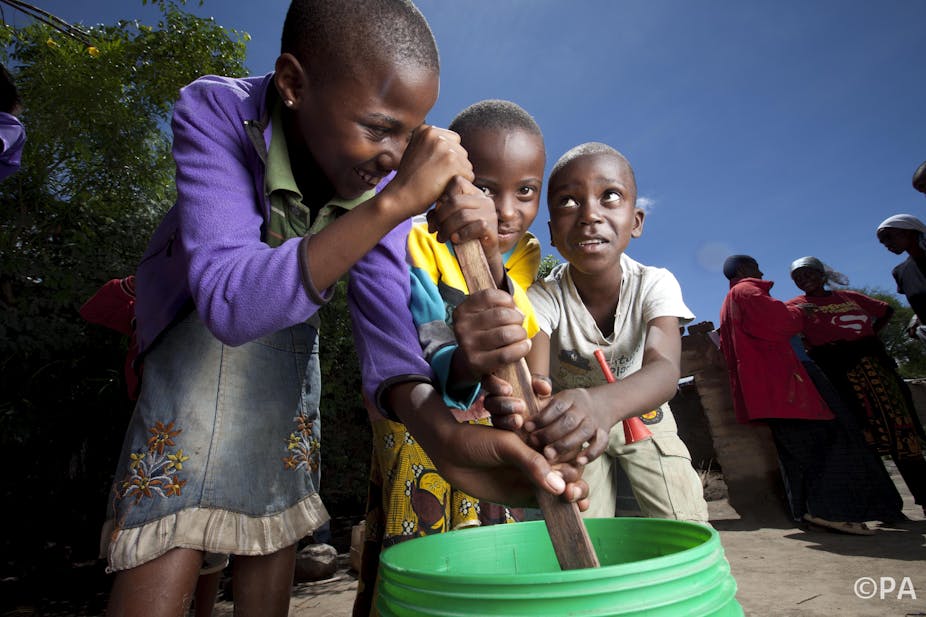The G20 has been dominated by Syria, tax reform, and playground infighting among world leaders. But where is the talk of ending hunger, eradicating diseases or cancelling debts?
Back in 2005, as the G8 prepared to meet in Edinburgh, the question of poverty appeared to dominate international and national debates. The issue of development and the responsibility of the global North to do more moved centre stage. It felt like a watershed moment as politicians, NGOs, campaigners and the general public all seemed to coalesce around a single goal of eliminating poverty.
In that year, the Africa Commission, launched by Tony Blair, published its report calling for more and better aid; a United Nations commission, headed by renowned economist Jeffrey Sachs, made similar recommendations; and the Make Poverty History campaign and Live8 made sure that development, poverty and aid were talking points in schools and in the media. By the time world leaders met in Scotland, aid and development was at the heart of the discussions.
Eight years on, as the G20 meet in St. Petersburg, one might ask whether that momentum, that optimism and belief that something should and could be done, has been lost. The Syrian crisis (inevitably) and global tax regulation have dominated. The main aid story from this year’s summit has been David Cameron’s announcement of £53m to assist Syrian refugees. So has development and efforts to eliminate poverty slipped off the agenda?
The short answer is no. While the language may not resemble the heady days of 2005, what is happening is a more mature and nuanced debate about the best ways to eliminate poverty and encourage pro-poor growth.
The idea that failed global tax regulation has impeded development in poor countries has finally started to get a hearing. With discoveries of major oil and gas deposits in east Africa and elsewhere, and prices for gold and other minerals still high, African governments have the potential to see sustained and substantial economic growth. But only if they are able to benefit from the revenues these industries will generate: and that means a fair, equitable and ironclad taxation regime that ensure revenue flows to the treasury.
Governments in Africa are losing out on billions of dollars of revenue as they are encouraged to offer tax holidays to promote investment in mining and other sectors. To pick one all too common example, according to an Africa Progress Panel report earlier this year, miners in Zambia’s copper mine industry paid a higher rate of taxation than the companies who owned the mines.
Analysis of tax concessions in Tanzania suggests they have led to a loss of around 6% of GDP. Last year’s UN Trade and Development Report criticised tax holidays and concessions, and called on governments to demand and take their fair share of revenues from the resources that exist in their countries. The International Monetary Fund, too, has sharply criticised such practices.
Corporations, as we have recently discovered in Europe and North America, are adept at navigating the maze of tax regulations to aggressively minimise their payments. The African Progress Panel report, for example, suggests trade mispricing (where corporations “trade” goods and services within their own companies) has cost African governments around $38 billion in tax revenues annually between 2008 and 2010.
And offshore tax regimes and havens cost the world trillions of dollars (some estimates suggest as much as $32 trillion) in tax revenues: revenues that could be used to roll out free treatment for the 15m people living with HIV who still have no access to life-saving drugs; to improve education and training to boost skills; to help improve transport and energy infrastructure, and so on.
Helping ensure governments in the global South collect and hold onto an increased share of the profits of businesses and industries in their own countries matters not just for the moral cause of ensuring corporations pay their fair share. It matters because increased aid is required to pick up the slack left by the taxation gap. It matters because tax revenues are essential for redistributive policies that can help the poorest access welfare, education, health and jobs.
It also matters because research tells us around 75% of the “bottom billion” - those living on less than $2 per day - live in officially designated Middle Income Countries (mostly in India, China, Pakistan, Nigeria and Indonesia). This suggests that in the long-term internal redistribution (through taxation) rather than international redistribution (through aid) will be of growing importance in addressing the needs of the world’s poorest.
What is missing now, and what was missing from the language of 2005, is the issue of equality. It is a subject politicians seem wary of addressing at the global or national level. It has not been heard, in a meaningful way, in the discussions on what will replace the Millennium Development Goals in two years time, for example.
Is there any leader brave enough to champion global equality as an aspiration at the next G8 or G20? Hello? Anyone?

